Blog
Subscribe now to receive the latest updates!

(MoneyforAgents) – Housing economists point to five compelling reasons why no crash is imminent. Inventories are still very low: A balanced market typically has a 5- or 6-month supply of housing inventory. The National Association of Realtors says there was just a 2.9-month supply of homes for sale in February (back in early 2022, that figure was a tiny 1.7 months). This ongoing lack of inventory explains why many buyers still have little choice but to bid up prices. And it also indicates that the supply-and-demand equation won’t allow a price crash soon. Builders didn’t build quickly enough to meet demand: Homebuilders pulled way back after the last crash and never fully ramped up to pre-2007 levels. Now, they cannot buy land and win regulatory approvals quickly enough to quench demand. While they are building as much as they can, a repeat of the overbuilding of 15 years ago looks unlikely. “The fundamental reason for the run-up in price is heightened demand and a lack of supply,” says Greg McBride, Bankrate’s chief financial analyst. “As builders bring more available homes to market, more homeowners decide to sell and prospective buyers get priced out of the market, supply and demand can come back into balance. It won’t happen overnight.” Demographic trends are creating new buyers: There’s strong demand for homes on many fronts. Many Americans who already owned homes decided during the pandemic that they needed more prominent places, especially with the rise of working from home . Millennials are a massive group in their prime buying years, and Hispanics are a growing demographic keen on homeownership. Lending standards remain strict: In 2007, “liar loans,” in which borrowers didn’t need to document their income, were common. Lenders offered mortgages to just about anyone, regardless of credit history or down payment size. Today, lenders impose strict standards on borrowers: Those getting a mortgage overwhelmingly have excellent credit. The median credit score for new mortgage borrowers in the fourth quarter of 2023 was an impressive 770, the Federal Reserve Bank of New York says. “If lending standards loosen and we go back to the wild, wild west days of 2004–2006, then that is a whole different animal,” says McBride. “If we start to see prices being bid up by the artificial buying power of loose lending standards, that’s when we worry about a crash.” Quite the opposite: A recent Federal Reserve survey of senior loan officers reveals that lending standards have tightened even further in anticipation of heightened demand when rates eventually drop. Foreclosure activity is silent: In the years after the housing crash, millions of foreclosures flooded the housing market, depressing prices. That’s not the case now. Most homeowners have a comfortable equity cushion in their homes. Lenders weren’t filing default notices during the height of the pandemic, pushing foreclosures to record lows in 2020. And while there has been an uptick in foreclosures since then, it’s nothing like it was. All of that adds up to a consensus: home prices are still pushing the bounds of affordability. But no, this boom shouldn’t end in a bust. Copyright 2024. MoneyforAgents.com Money for Agents lets you stop guessing when you get paid and take control of your cash flow. Create an account now and get your commission advance within 2 days or less (often the same day)!

(MoneyforAgents.com) – Marketing sells more than just properties in the competitive real estate market; it sells dreams, dependability, and trust. The importance of marketing in real estate has increased dramatically as the digital landscape develops, demonstrating that it is not only a necessary tool but also the cornerstone of success in the sector. First Impressions In the real estate industry, first impressions are frequently formed online, even before a prospective buyer enters the property. The difference between a listing that lingers and one that ignites initial attention can be found in the quality of images, virtual tours, and property descriptions. A property that uses effective marketing will be seen and remembered, as it will immediately appeal to the needs and wants of the intended market. Branding Building a brand is the goal of marketing for real estate professionals, not only those who sell houses. By positioning an agent or agency as a market leader, a strong, identifiable brand can draw in more business. Marketing assists in creating a brand identity that connects with customers through a consistent message, design, and values. This helps to develop client loyalty and trust that can last a lifetime of real estate transactions. Making Use of Social Media Social media has become a vital resource for real estate brokers, providing a way to present their listings, impart knowledge, and establish personal connections with clients. By using platforms such as Instagram, Facebook, and LinkedIn, agents may further establish themselves as reliable advisors in the real estate process through targeted advertising, real-time engagement, and the distribution of useful content, ranging from home renovation tips to market trends. Making Use of Technology How properties are marketed and sold has changed due to technology's incorporation. Drone photography, augmented reality apps, and virtual reality tours provide immersive experiences that draw customers and distinguish properties. Marketing initiatives are designed to reach the appropriate audience through data analytics and SEO tactics at the right time to maximize visibility and engagement. Storytelling to Engage Audiences Storytelling is at the core of real estate marketing. Effective marketing tells the story of each property in a way that inspires empathy and a sense of connection. A captivating marketing strategy may attract and motivate potential buyers, regardless of the subject matter—be it the history of a historic property or the potential of undeveloped land. In summary The key to success in real estate is marketing. It serves as a means for agencies and agents to convey value, set themselves apart from rivals, and establish genuine connections with clients. Marketing is essential for opening doors and facilitating these interactions in a field where matching the right person with the right property determines success. Marketing tactics and resources will change along with the real estate market. Still, their significance will never change—they are vital to the sector.

(MoneyforAgents.com) – The Federal Reserve is still planning rate cuts for this year, and house buying may be disrupted by changes in selling procedures. This is the prognosis. President Biden has started looking for ways his administration may lower the high cost of housing, real estate brokers are expected to reduce their commissions following a significant settlement, and Federal Reserve officials want to lower interest rates this year. In summary, a lot of change is occurring in the housing market. Despite a notable slowdown in sales due to increased borrowing rates, housing and rental rates are still significantly higher than before the epidemic. Whether the current advancements will reduce costs is the subject at hand. According to housing industry economists, cost increases are anticipated to be relatively low within the coming year. However, they do not expect real price reductions in most markets, particularly for residential purchases. Cheaper mortgages could entice buyers into a market with too few homes for sale, even though lower rates can help attract more supply around the edges. Demographic factors are still driving strong demand. Redfin CEO Glenn Kelman stated, "It has become almost impossible for me to imagine home prices actually going down." "Inventory constraints are extremely severe." Here are the changes and their potential effects on renters, sellers, and buyers. A decline in interest rates is anticipated The Fed's decision to raise interest rates to a level not seen in more than two decades has contributed to the recent high cost of mortgages. Although the central bank does not set mortgage rates, its policy decisions raise borrowing costs throughout the economy. 30-year mortgage rates have been averaging under 7%, recently rising from less than 3% in 2021. When the Fed reduces borrowing costs, those rates may also decrease, especially if investors start to believe that the rate cut will be more significant than they presently think. More often than not, investors' expectations of what the Fed will do cause changes in mortgage rates and other borrowing costs, not the central bank's actions. This is one of the reasons why mortgage rates have been gradually declining since they peaked in late 2023 at roughly 7.8 percent: The inflation rate has decreased, and it is now evident that the Fed may shortly lower its policy rate. On Wednesday, central bankers predicted that they may lower interest rates three times this year and three more times the following year. According to some analysts, mortgage rates may fall much lower in 2024. For example, Greg McBride of Bankrate believes they may finish the year at roughly 6 percent. Lower borrowing costs will impact the housing market in two significant ways. First, they lower the cost of financing a purchase: A $400,000 mortgage with a 7.8 percent interest rate would pay roughly $2,880 each month; at a 6 percent interest rate, it would be closer to $2,400. Such a drop can increase demand from prospective purchasers. Secondly, if rates drop, more homeowners might decide to sell. Many Americans are reluctant to move because they are sitting on low-cost mortgages that they refinanced during the pandemic. Rate lock-in may decrease if the difference between current mortgage rates and market rates narrows, which might lead to an increase in the number of available starter homes. Brokerage operations are about to change The cost of borrowing is not the only factor that could affect the home market. In a move that might upend the home-buying process, the National Association of Realtors, a strong organization that has long established the rules for house sales, has decided to settle several lawsuits. The deal would relieve agents representing home sellers of the obligation to pay purchasers' agents in a conspicuously visible way and subject to court approval. The typical industry commission of 5 or 6 percent will decrease due to the shift. It's unclear just how that will affect housing expenses. There's talk that it might drive down prices, partly because sellers would find listing their properties at lower commissions slightly more appealing. However, the amount that prices can drop is limited. While the move may save Americans money on transaction fees, according to Igor Popov, chief economist at Apartment List, house sellers would still continue to try to charge as much as they could in cutthroat markets. "It's not a big deal for prices and quantities, but it's a big deal for the industry," he remarked. Agents are unsure how the consequences will manifest. Long Island realtor Jovanni Ortiz said he had heard colleagues question whether agents might quit the industry. Still, no one was certain how much this would cost agents or how it would change the home-buying experience. Mr. Ortiz stated that it was still too early to say. The White House is thinking about policies Concerned that Americans' inability to afford a house or pay their rent is affecting the country's economic confidence, President Biden has become fixated on the exorbitant cost of housing in recent weeks. He unveiled further initiatives to support homebuyers in his State of the Union address. More than $250 billion in expenditure recommendations are included in his most recent budget request to address the high cost of housing. These plans include boosting rental assistance for low-income workers and constructing or renovating two million housing units. However, most of those proposals don't seem likely to be implemented immediately. With the November election approaching and the Republicans controlling the House, there doesn't seem to be much prospect of enacting a significant housing law this year. Nevertheless, Mr. Biden has instructed his administration to take independent action to lower certain expenses related to purchasing a home. By eliminating title insurance costs for federally backed mortgages, he has the potential to save each transaction at least $1,000. He urged real estate brokers to pass the savings from reduced mandatory commissions to buyers this week. Rental housing is becoming more available, but this trend may not last long Recent months have seen a significant alleviation of the supply shortage, allowing rents on new leases to rise only slowly or even decline in certain regions. Several large rental buildings were built in several Southern and Mountain West cities, which relieved pressure on monthly costs. However, Mr. Popov stated there won't be much new inventory in 2026 or the following year, so the cool-down might be minimal. The availability of homes for sale is a less happy tale. Not only have fewer sellers been listing their homes for sale, but rising mortgage rates have also hurt home construction. This has made a shortage that has been getting worse for years, and it has meant that prices have stayed high despite declining sales of both new and existing homes due to high mortgage rates. Builders might be more inclined to develop new homes as soon as they observe indications of a thawing market. However, many customers will be drawn in by the somewhat reduced prices. Senior economist at BNP Paribas Yelena Shulyatyeva stated, "Demand is so strong that it's unlikely that the housing market will fall apart." She pointed out, among other trends, that many millennials are still in the market to purchase a home. The final result? According to Mr. Popov, the housing market may soon revert to more typical levels. At the same time, a price decline is improbable; price gains might be more gradual than in the significant spikes since 2020. "The pandemic has caused numerous significant blows to the housing market, and we've been feeling the aftershocks of those blows," he stated. "The housing market will experience a return to more normal numbers and sentiment."

(MoneyforAgents.com) – Investing in real estate is a time-honored method for building wealth, offering potential for passive income, capital appreciation, and tax advantages. However, not all investment properties are created equal, and making a wise choice requires careful consideration. Here’s what to look for when buying an investment property to ensure you make a profitable and sound investment. Location, Location, Location The adage “location, location, location” holds especially true in real estate investing. The right location can dictate the property’s appeal to renters or buyers and significantly affect its future value. Consider the following factors: Proximity to amenities: Look for properties close to schools, parks, shops, and public transportation. Economic stability: Opt for areas with low unemployment rates and strong job growth, which tend to attract more tenants. Safety: Properties in safe neighborhoods generally have higher occupancy rates. Future development: Information on planned infrastructure or commercial projects can indicate potential appreciation. Property Condition The property's condition can significantly impact your budget and potential return on investment (ROI). While fixer-uppers may come at a lower purchase price, they require a budget for renovations. Assess the following: Age and construction: Older properties may have more character and maintenance issues. Necessary repairs: Consider whether repairs are cosmetic or structural. Structural repairs can be costly and time-consuming. Inspection reports: Always conduct a professional property inspection to uncover hidden issues. Market Analysis Understanding the market dynamics of the area is crucial for making an informed investment decision. This includes analyzing: Rental yields: Look at the average rental income in the area compared to the property’s cost. Vacancy rates: High vacancy rates may indicate a less desirable area for renters. Comparables: Research sales of similar properties in the area to ensure you’re paying a fair price. Financial Considerations A sound investment fits within your budget and financial goals. Here are key financial factors to consider: Cash flow: Calculate potential rental income minus all expenses (including mortgage, taxes, insurance, and maintenance) to ensure positive cash flow. Financing options: Explore different financing options and interest rates to find the best deal. Tax implications: Understand the tax deductions and liabilities associated with owning an investment property, including property tax, depreciation, and capital gains tax. Legal and Zoning Regulations Be aware of local laws and regulations that could affect your investment: Zoning laws: These can impact property use and future developments in the area. Landlord-tenant laws: Familiarize yourself with local regulations regarding tenant rights, eviction processes, and rental agreements. HOA rules: If the property is in a community with a homeowners’ association, understand the rules and fees involved. Potential for Appreciation or Cash Flow Decide whether your primary goal is long-term appreciation or immediate cash flow. Properties in developing neighborhoods offer more significant appreciation potential, while those in established areas can provide steady rental income. Exit Strategy Have a clear exit strategy in place. Whether you plan to sell after a certain period, refinance, or hold the property indefinitely, your strategy should align with your overall investment goals. Copyright 2024. MoneyforAgents.com Money for Agents lets you stop guessing when you get paid and take control of your cash flow. Create an account now and get your commission advance within 2 days or less (often the same day)!

(MoneyforAgents.com)—Over the past few years, there has been much discussion about the recession. That could make you fear that what happened in 2008 is about to happen again. Here are some recent expert forecasts to help you understand why that isn't likely to occur. The economy is doing reasonably well, according to LendingTree Senior Economist Jacob Channel: “At least right now, the fundamentals of the economy, despite some hiccups, are doing pretty well. While things are far from perfect, the economy is probably doing better than people want to give it credit for.” According to a recent Wall Street Journal survey, only 39% of economists predict a recession in the upcoming year. That is far less than the 61% who predicted a recession just a year ago. Most analysts predict that the upcoming year won't see a recession. The present unemployment rate is one cause. Let's examine our current situation compared to past Trading Economics , Macrotrends , and the Bureau of Labor Statistics (BLS) statistics. When we do, it becomes evident that there is still a relatively low unemployment rate today. The orange bar represents the average 5.7% unemployment rate since 1948. The red bar indicates that the unemployment rate reached 8.3% immediately following the 2008 housing market implosion and financial crisis. The difference between those two figures and the January unemployment rate (highlighted in blue) is substantial. Will the unemployment rate increase, though? Take a look at the graph below for the solution. It displays the experts' predictions for unemployment over the next three years based on the long-term average using data from that same Wall Street Journal survey. As you can see, economists predict that over the next three years, the unemployment rate will not even approach the long-term average, much less the 8.3% that was recorded during the last market meltdown. Nonetheless, some people will lose their jobs in 2019 if these predictions come to pass. Anytime someone is unemployed, friends and family must also deal with a complex scenario besides the individual. The crucial concern remains: will the unemployment rate be high enough to trigger a wave of foreclosures, destabilizing the real estate market? Forecasts indicate that the unemployment rate will probably continue to be lower than the 75-year average. Thus, a significant influence on the home market from a wave of foreclosures is not something you should anticipate. Most specialists predict that the upcoming year will not see a recession and that the jobless rate will not increase significantly. Thus, you don't have to worry about a wave of foreclosures sending the home market into meltdown.

(MoneyforAgents.com) – Becoming a real estate broker and working as a managing broker or broker-owner is a natural next step for many real estate agents on their journey to professional development. In contrast to other businesses, where advancement to management positions is typically associated with higher revenue levels, several brokers encounter difficulties in matching the financial performance of their most prosperous agents. Upstream costs might make it challenging for brokers who operate as franchise owners in a big-box brokerage model to stay profitable. Overhead and running expenditures can make it nearly impossible for brokers who operate as independent broker-owners, particularly in the early stages of their business. Being a broke broker is not enjoyable and may prevent you from providing the assistance your agents require to expand their companies and, consequently, your own. Here are seven strategies to make sure you don't end up the poorest person in your company: 1. Choose if you want to be a broker that competes or doesn't Without being in production, you might discover that you cannot support yourself, at least not at first. Ensure that the agents you hire have enough experience to not feel that you are working against their best interests or that you plan to feed leads to them as needed. 2. Create a lucrative commission schedule Do the math on your commission structure to ensure you can run your business effectively and in a way that allows you to earn a reasonable, competitive wage in line with local market norms. 3. Pay attention to premium or volume listings (or both) To enable your agents and yourself to earn more commissions, ensure your branding and marketing will allow them to obtain premium or higher-volume listings. Give your agents the necessary resources and assistance to operate in these markets. 4. Make use of your knowledge You may have an extensive network that enables you to network with other brokers and target high-net-worth customers. You may have acquired specialized knowledge that enables your brokerage to rule a particular market or niche. To improve your company's reputation (as well as your own), establish yourself as a subject matter expert and leader in the market. You have to create a distinctive value offer. 5. Make your management better To maximize your agents' productivity and save time on hiring, onboarding, and retention efforts, ensure you take the best care of them. Grow your team strategically so members are content to help one another rather than vying for scraps. 6. Vary your sources of income Expand the range of services your brokerage provides by including advisory and financial services and property management. Strive to establish strategic alliances with title companies or lenders. Create your real estate investment portfolio by enrolling in a real estate course or using your professional experience. Your income will increase, and your protection against changes in the market will improve the number of sources of income you have. 7. Utilize other people's experience Hire a fractional CFO and collaborate with a tax strategist to ensure you make informed judgments regarding every dollar coming into and out of your brokerage. To make the most use of your skills, focus more on the activities that bring in money and give other people support duties. Your agents are essential to your financial success, and vice versa. Ensure that the company you're starting will allow everyone to prosper, especially you.

(MoneyforAgents.com) – A few prospective homebuyers decided to hold off after seeing a slight increase in mortgage rates this week. Here's why they might not want to hold off, though. This week's spike in the 30-year fixed-rate mortgage average demonstrated to prospective homeowners how sensitive they are to changes in mortgage rates. According to the Mortgage Bankers Association, the rate increased to 6.77%, and the number of mortgage applications for house purchases decreased by 3%. Although borrowing costs have stabilized, home purchasers' purchasing power may be impacted by slight fluctuations in interest rates. According to Jessica Lautz, deputy chief economist at the National Association of REALTORS®, "while mortgage interest rates edged up weekly, the overall trajectory from fall 2023 is down and is now a full percentage point below the recent high," when rates were close to 8%. She added , "Although mortgage interest rates might drop to as low as 6% in the middle to end of the year, purchasers need to consider what is best for them personally. When new employment, marriages, and babies are the true decision-makers, it is rarely effective to time the real estate market only based on mortgage interest rates—especially marginal changes.” Waiting could not save buyers much, either. According to Lautz, at this week's average interest rate, buyers of the median $400,000 property with a 20% down payment would probably have a monthly mortgage payment of roughly $2,080. Homebuyers may have saved almost $70 a month when rates averaged 6.64% last week, but that was based on a median property price of $391,700. The cost of homes is rapidly increasing. According to NAR, the median price of an existing house reached an all-time high in December, and price increases are anticipated. According to NAR's prediction , the yearly median home price would rise 1.4% this year and by an additional 2.6% in 2025 to $405,200. Furthermore, the supply of homes is still at an all-time low, which presents a significant barrier for prospective homeowners. Economists predict that this will maintain pressure on property prices. For the week ending February 15, Freddie Mac has released the following nationwide averages for mortgage rates: 30-year fixed-rate mortgages: the average was 6.77%, up from 6.64% the previous week. At this time last year, the 30-year rate averaged 6.32%. Mortgages with a 15-year fixed rate saw an average of 6.12%, up from 5.90% the previous week. 15-year rates averaged 5.51% a year ago.

(MoneyforAgents.com) – According to data from the U.S. Bureau of Labor Statistics, inflation increased in January but did so more slowly than anticipated. This led analysts to speculate that the Federal Reserve would take longer to reduce borrowing prices. In January, the Consumer Price Index (CPI) saw an increase in inflation of 3.1 percent, marginally less than the 3.4 percent increase in the previous month. However, the CPI for January exceeded economists' expectations. They had calculated that it would be 2.9 percent. Given that inflation does not appear to be waning as quickly as expected, experts advise against the central bank cutting interest rates immediately since this could hurt the price of house loans. Mortgage borrowing costs increased to 8% in March 2022, the most since the year 2000, partly due to rate increases that started that month. Although mortgage rates have dropped in recent weeks to a range of mid-6 percent, housing analysts warn that rising inflation above the regulators' 2 percent objective could halt the rate decline. Chief realtor.com economist Danielle Hale wrote in a note, "For the housing market, today's data means that mortgage rates are likely to hang on to the narrow range they've occupied since late December while moving toward the upper end of that range." At the beginning of the year, some investors predicted that the Fed would start cutting the funds rate from its current two-decade-high range of 5.25 to 5.5 percent as early as March. However, officials stated in January that although they had most certainly reached the end of their cycle of rate increases, an instant reduction in rates was improbable. Just as in December, housing prices continued to be the biggest driver of inflation in January, increasing by 0.6 percent and "contributing over two thirds of the monthly all items increase," according to the Bureau of Labor Statistics. Experts currently predict that rates may fall later, after the January reading. The National Association of Realtors' chief economist, Lawrence Yun, told Newsweek in a statement that "the Federal Reserve will not cut interest rates in the first half of this year." However, in the year's second half, rate reductions of three, four, or even five rounds will be feasible. Weekly mortgage rates will fluctuate, but by year's end, they'll stabilize around 6%. Some observers stated that the inflation data validates the Fed's cautious stance of holding off on making changes to policy until they are sure that prices are heading lower toward their target. The Fed has been emphasizing that more data, particularly inflation-related data, will be needed before making a policy change, according to a study that LPL Financial chief global strategist Quincy Krosby shared with Newsweek . "The 'last mile'—as expected—is proving to be stickier and more stubborn," he added. Because of the high prices, some economists believe that the Fed might start reducing rates as early as the summer, when more inflation data becomes available to paint a more complete picture of how prices are performing. "This report underscores the Fed's messaging that they'll need more information, specifically inflation-related data, before a policy transition," Quincy Krosby, chief global strategist for LPL Financial, said in a note shared with Newsweek. "The 'last mile'—as expected—is proving to be stickier and more stubborn." In addition, Sweet said that the Fed's officials are more focused on the PCE inflation index, which has been declining more quickly than the CPI. Later this month, the most recent data for that metric is expected to be released. Regarding the Fed's potential timing of rate cuts, late spring or early summer is the most likely time frame for borrowing costs to decline across the economy. Mortgage rates may drop in tandem with the Fed's expected rate reduction, which would assist purchasers in experiencing a decrease in their monthly payments. "Fed policymakers will likely put this inflation report [in] the 'not so good' column as they continue to exercise caution in assessing when to start easing policy," Gregory Daco, chief economist at EY, said. "Our longstanding view has been that the Fed would start cutting rates in May, but this report increases the odds of a June onset. We still expect a total of 100 [basis points] of rate cuts this year. Markets appear to slowly be aligning to this view," Daco added.

(MoneyforAgents.com) – Although many homeowners wait until the spring to offer their homes for sale, there are a few clear benefits to listing this year and being ahead of the game. Home sales usually slow down during the winter, but this year is slightly different. For most of 2023, high interest rates kept a large portion of the US real estate industry under a deep freeze. However, a ton of pent-up demand (and supply) could suddenly explode onto the market now that rates have somewhat decreased in the new year. A portion of it is already available. The timing of a house sale can be crucial. Like equities, home prices increase and fall. If you enter the market during the height of demand, you can tip the odds in your favor and get better terms and more significant earnings. So, is it time for you to list your property? Continue reading to discover more justifications for wanting to enter the 2024 real estate market early. 1. Interest rates on mortgages are declining Mortgage interest rates were a primary factor in property sellers' reluctance to sell in 2023. Rates on a 30-year fixed mortgage hit a 23-year high of 7.79% towards the end of October. Due to the possibility of having to purchase a new home and incurring higher mortgage rates if their current residences sold, homeowners experienced a "lock-in" effect. In fact, according to Realtor.com, around two-thirds of homeowners had mortgages with interest rates under 4%. Over 90% had a rate that was less than 6%. However, mortgage rates have started to decline recently. According to Realtor.com's 2024 housing forecast, mortgage rates will drop further and wind up at the mid-6% level by the end of the year. Thus, home sellers will benefit more by switching to a new mortgage rather than losing out on their current one. According to Realtor.com Chief Economist Danielle Hale, "most sellers, especially those who have lived in their homes for several years, will be able to walk away from a transaction in a good position." 2. Compare agents: There is still a shortage of housing Even in this challenging market, sellers have one significant advantage: few homes are available. According to Cindy Allen, a real estate agent in the Dallas and Fort Worth, Texas, area, "the housing supply is still well below the historical 'balanced market' number of six months' supply." "A property can still be the focal point of attention because there aren't enough available homes." If a house is listed in good condition and at the correct price, it "can fetch a quick offer," the realtor continues. According to Jonathan Spears, Realtor® and founder of Spears Group, this is particularly true for distinctive or unusual houses. As he puts it, "quality is always in high demand." These houses are "selling at the highest frequency they ever have" in his Florida area. Spears adds that while most people "can't go out and build the house that you have at a better price point," sellers can still profit from inflation as it is currently high. He states that purchasers typically have to make do with the available goods. "I would be in the mood to sell if I were a homeowner and I had something that's quality," he claims. 3. More purchasers could soon join the market Many purchasers have recently been priced out of the market due to rising housing prices, inflation, and high mortgage rates. However, experts believe that some purchasers may emerge from their slumber now that mortgage rates are finally declining, releasing their pent-up desire for the few astute sellers to be on the market. More homes on the market due to more buyers "will inevitably lead to increased competition among sellers," according to Allen. If they list now, sellers may experience less competition before other sellers swarm the market. 4. Home sellers won't put in as much effort Seasonally speaking, analysts claim that the first few months of the year might be excellent for sales. According to Cedric Stewart of Entourage RG in Keller Williams, near Washington, DC, the start of the year can be a surprisingly advantageous time to list. Many people discover that their tax refunds and work incentives have left them with extra money. This can prompt further bids at a more fantastic price. Stewart agrees that because fewer people are house-looking in the winter, homeowners who list in that season usually don't receive as many offers as those who list in the summer. However, he notes that those few offers made during the winter months may have greater significance because sellers may not have to put in as much effort to obtain them. "There might be four or five other houses that people are looking at that are similar to yours, but you might get more offers in June," he says. You might not be the ball's belle. To be the star of the show, you need to make some changes. If you need to move in January, you're most likely the only one in the area. They must thus deal with you. Because it is a fact that those who require immediate relocation must do so. 5. Sellers who intend to purchase can avoid the crowd Selling soon also allows homeowners to move into their new residence before the market heats up and receive a decent price for their house. According to Stewart, when there isn't too much buyer competition, it's the ideal moment to relocate. According to him, buyers can still join the market "before the prices get spring- and summer-crazy" if sellers move out of their houses immediately. Spears concurs, stating that such circumstances can result in a win-win scenario for present homeowners. "We're returning to a market where you can still sell for a very fair price, and if you decide to buy again, you'll have more options and negotiating power than before," Spears adds. Thus, you have an exceptional chance to purchase low and sell high simultaneously. 6. Emotional motives to sell frequently prevail over market ambiguity Homeowners who need to move for any reason—job, family size change, retirement, or anything else—should not be discouraged from listing, even though timing the market while doing so can benefit sellers. The main driving force is frequently not merely money. Individual needs also matter, according to Allen. Sometimes, sellers have to remind themselves of their initial motivations for moving. There are always solutions to help make a transfer possible should their needs change or their lives take a different turn.

(MoneyforAgents.com) – The National Association of Realtors published their December pending sales figures last week. Impressively, the headline showed an 8% increase from December 2022. If you've been following the Altos data, house sales have been rising over the past two months. When mortgage rates recently fell in December, they began to increase. When the housing market was heating up in December last year, we released sales growth statistics. Is this a pattern that will last the entire year? From what we currently have access to, it appears likely. However, January saw a sharp slowdown in December as the nation was again plunged into a deep freeze and mortgage rates spiked upward. Thus, this expansion is not steady. In the meantime, annual growth in housing prices is also relatively strong. Contract-rise residences Right now, more properties are under contract than at this time last year. Although this trend will endure, there is no certainty. This week's new pending and sales were lower than they were at the same time last year. Experts boldly predicted that home sales would increase by 15% in 2024; however, the growth rate from the previous year has now declined for four weeks running! Growth in sales is not assured According to reports, 56,000 contracts for the purchase of single-family homes were started this week. The majority of 2023 saw 20–30% less home sales than 2022 as the year went on. Last year, home sales were incredibly slow. The trend finally turned positive in November and returned to growth. We printed 20% more sales in a week a few weeks ago than we did the year before. There was 0.8% less this week. Thus, it was a quiet week. As said, there is sustained growth in sales. However, there is no certainty. This increase won't last if mortgage rates remain in the sevens this year. Home sales increase Currently, 276,000 single-family houses are under contract, which is 5% more than last year. As a result, we already know that first-quarter home sales increased by 5% over the previous year. I already have that covered. This trend will continue even with the slight decline in new contracts this week if the 6s remain in the mortgage rate range. Two hundred seventy-six thousand single-family houses are currently under contract, up from 264,000 last year. Undoubtedly, 276,000 represents over 30% fewer applications than in January 2022, at the height of the cheap money craze. We're coming off such a low base, which is one reason the housing market can expand this year. Twenty-three saw very few home sales. Thus, 24 is expected to be a growing year. Less volatility in mortgage rates The fact that mortgage rates are less volatile in 2024 is another factor contributing to the growth in home sales volume. Sales are expected to increase if mortgage rates remain in the sixes this year. They will halt this growth trend if they return to the mid-sevens. During September and October of last year, we observed that stall. In the previous few weeks, we have seen a slight increase in mortgage rates from the mid-sixties to 6.9%. Any estimate of this year's growth in home sales that I make is contingent upon mortgage rates remaining in the 7s or 8s. However, that estimate does not also call for a decline in mortgage rates. Demand from home buyers is seen in the sixties when rates are stable. Mortgage rates are not estimated, and many people who try to do so predict rates in the 5s by year's end. If that occurs, I predict even greater demand, a sharp increase in the number of homes sold combined with an inventory reduction, and a return to rising home prices. Inventory decreases marginally There are 503,000 unsold single-family houses on the market right now. That represents the nation's current inventory. Last week's inventory decreased by six-tenths of a percent. That is rather typical for the final week of January. Every year, during the winter, inventory levels typically fluctuate around the year's low before beginning to rise in February and March due to a surge in new vendors. Due mainly to the unpredictable nature of mortgage rate variations, demand has been higher in the spring of the past few years. As a result, the number of unsold properties on the market has been steadily falling through April. The upward trend in home prices will persist It's no secret that home prices have increased over the previous year if you've been observing any of the numerous metrics tracking home prices in the news. And that pattern of rising home prices this year is expected to continue, according to all the leading indicators included in the Altos data. In the US, single-family homes currently have a median price of $424,000. That is still a few percent higher than it was a year ago, and it is up 1% from last week. We utilize the pricing data from Altos' active market to predict where home sales prices will end in the coming months. A house is listed now, it receives an offer in February, closes in March or April, and the typical housing data reports the transaction in May. However, the location of those prices is currently visible. Additionally, those costs have increased. The price of the properties under contract is a highly accurate indicator of the sales that will close next month. The homes under contract have a median price of slightly less than $385,000. This is 6.8% more than it was at this time last year. Due to the sharp increase in mortgage rates in 2022, demand for purchases drastically decreased. The second quarter of 2022 marked the peak of housing prices. Home prices thus showed year-over-year declines over the same time a year later, in April, May, and June 2023. Communicating this to buyers and sellers can be challenging. Some others are keeping a close eye on pricing, hoping to take advantage of any unexpected discounts. However, they could be unaware of the level of competition that is waiting for them. People require your assistance in comprehending this rapidly evolving market , so stay sharp and informed.
